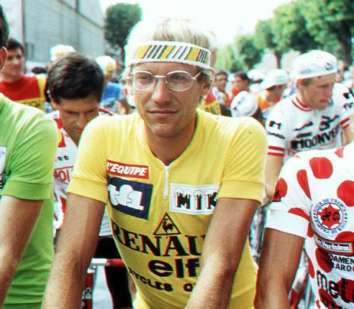One of my great childhood memories is watching the Tour de France on Channel 4 with my elder brother. We’d sit inside while the blazed outside, eating Skips, listening to the pop-snyth perfection of its theme tune, watching the beautiful French countryside roll past and the rake thin cyclists climb hills in terrible agony, all accompanied by the nation’s ‘true poet laureate’ Phil Liggett.
Known for the unusual lyricism of his commentary, a chap called Doug Donaldson eventually compiled a book of poetry based on his quotes: ‘Dancing on the Pedals,’ after hearing the commentary: ‘He’s dancing on the pedals in a most immodest way.’ Here are a few more from the great man.

“Once you pull on that golden fleece, you become two men..”
“There’s no reason to rush into hell.”
“Its only a mountain, one of many you can see on this French Country morning, but for 171 young men it would be a place where they would dare to ask themselves the questions of greatness”
It all got me thinking about how the great poets would fare in the Tour de France, with the following results:
THE POETS JOIN THE TOUR
The former Laureates make up an early breakaway pack
Robert Bridges at the head of the Peleton, a canvas satchel
of sardines and eggs bouncing softly behind his back.
Betjeman and Hughes have yet to reveal themselves
preferring to let their thin jackets flap in the streets of Dunkirk.
At the end of the first stage R.S.Thomas is the unlikely
wearer of the yellow jersey; less plausible still in that
he has yet to discard his duffel coat or red woollen tie.
He glares at the spectators lining the curbs of Gant.
The race is not without scandal; Manley Hopkins enlists
the support of some Jesuit priests who bundle his bicycle
into the back of their Citroen hatchback ply him with
altar wine and roll him out the other side of Tignes.
At stage four, the Liverpool poets are the last ones out
after a long evening on the Brie and Cavernet Sauvignon
while running an impromptu workshop on French rhyming slang.
The prospect of the Champange valleys of Joiny is enough
To revive them, although Elizabeth Barrett Browning
shines in the sprint, bolt upright in her bonnet and ruffles.
The journalists report her embroided cuffs and lupine eyes.
In the support vehicle, Robert Browning throws her hankies
dipped in lavender and flasks of hot, Camomile tea,
Last in is Tony Harrison in a woollen jumper with holes
at each elbow; he doggedly steers an old Triumph Twenty
pressing down on one knee, his other hand steadying
a volume of Philip Gross laid open on the handlebars.
Through the leafy woods that cool the scorched roads
from Chablis to Autun and the riders reach the hills.
Nonetheless, buoyed on by the wind, MacNeice makes
an attack pressing at the heels of William Carlos Williams,
who has been impressive from the start; then at the crossroads
at Gimont, Philip Larkin emerges like a sunbeam from a cloud
and cuts a line between them tucked into the wind.
Up in the peaks, Motion and Muldoon battle for the Polka-Dot.
The stretch from Cognac to Angouleme is almost too much:
beautiful sections of unbending road, allowing liberal
sampling of the produce; in the woods of Plaisac, some
reported the ghost of Ern Malley up ahead in the heat haze.
By the Cheauvreuages Valley the favourites have made
themselves known, although Thomas Hardy squanders
an early stage lead by taking tea and cake in Bonneville.
As the leader enters Paris, a hush falls on the crowd like rain
on the Loire; then as the river mist recedes, he appears
grinning wide, John Betjeman on a Raleigh Sprinter, his arms
outstretched, riding naked down the Champs Elycees.


